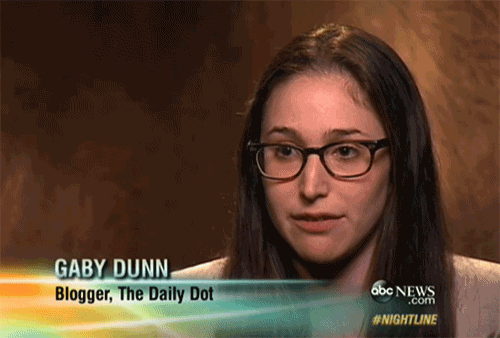Not Rich But Famous: An Internet Story

YouTube star Brittany Ashley and others like her, including Gaby Dunn, have discovered the depressing limits of Internet fame, as chronicled in Dunn’s new piece on Fusion. They are so well-known and recognizable that, when people seeing them do a regular job, it causes confusion. And yet a regular job is not merely an option, it’s a necessity.
Hers just wasn’t the breezy, glamorous life people expected from her. Customers had approached her at work before, starstruck but confused. Why would someone with 90,000 Instagram followers be serving brunch?
Simple: because Ashley needed the money. And yet, she says, “as I started having more visibility on the internet, I had to scale back on serving people.” Her wallet took the hit, and so did her pride. “My coworkers would tell me a table of kids was freaking out [about seeing me] and I’m like, ‘What? Am I going to go say hi and take a picture in my work uniform?’”
The disconnect between internet fame and financial security is hard to comprehend for both creators and fans. But it’s the crux of many mid-level web personalities’ lives.
Dunn sums it up, “Many famous social media stars are too visible to have ‘real’ jobs, but too broke not to.”
Are you rolling your eyes a bit? You’re not alone.
@markyzaguirre Still, in any profession, being able to earn a good income doing what you want is more of a privilege than a right
— @hunterw
For the most part, though, the response has been warm. It’s not easy for the Internet famous — or anyone, really — to cop to falling short of their own expectations of themselves. And talking honestly and publicly about money in our culture is a nerve-wracking thing for anyone to do.
It really also depends on your finances before starting YouTube. My family isn't wealthy and I had debts/loans to pay off. That's just me.
YouTubers and content creators in general need to generate revenue in order to keep doing the things their audiences enjoy. Yet attempts to generate revenue get them branded as “sellouts.” What on earth does “sellout” even mean in the context of 21st century celebrity?
YouTuber Anna Akana, fed up with comments calling her a “sellout,” posted a video in June explaining how without brand deals, YouTubers can’t survive. Akana has hit 1 million subscribers by creating a podcast, designing a clothing line, and yes, taking money for sponsored videos. Some fans understood and defended YouTubers needing to make money. Others vowed never to watch her again. It’s a terrifying risk whenever you post a branded video. …
Money anxiety is a deep and longtime trigger for me. I’ve almost quit Just Between Us a few times, once after spending hours hysterically crying in my parked car because I wasn’t sure how I was going to make rent. My parents couldn’t help me financially because they had their own problems. I had already sold some of my old clothing at Crossroads and Buffalo Exchange. Allison’s parents offered to lend me money, but I wasn’t comfortable taking from them. Finally I borrowed money from a very kind friend who I’ve since paid back. During that time, I had more than 70,000 Twitter followers.
Popularity, man. It doesn’t always pay. Not monetizing though raises the terrifying risk of ending up like one of those artists from “RENT” who live off of free housing and ATM theft: “Hey, artist, you got a dollar? I thought not.”
Support The Billfold
The Billfold continues to exist thanks to support from our readers. Help us continue to do our work by making a monthly pledge on Patreon or a one-time-only contribution through PayPal.
Comments